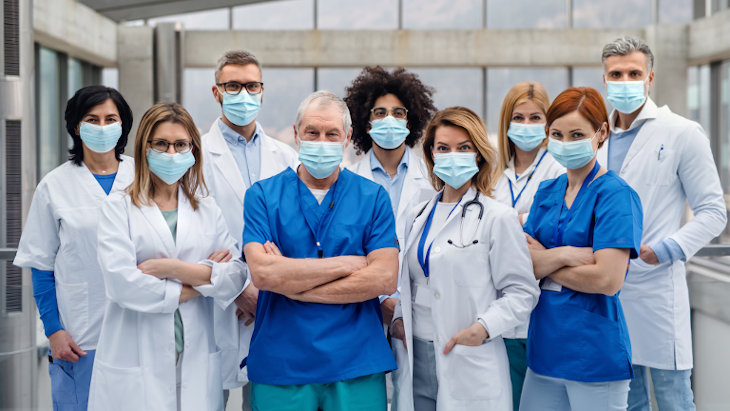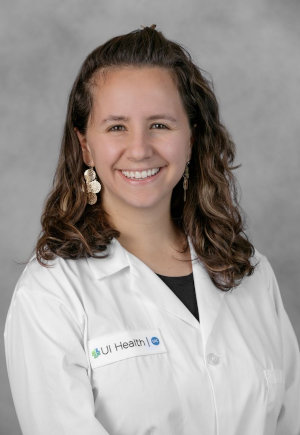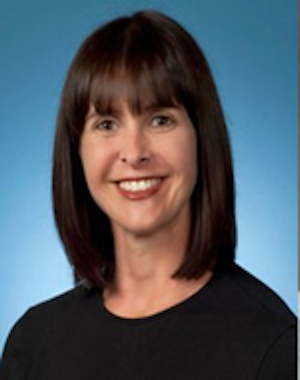 Vampire Weekend's Surprising Jewish Stories
Vampire Weekend's Surprising Jewish Stories


11 min read
Four Jewish doctors describe their experiences battling Covid-19.
They are family physicians, an emergency room doctor, and a specialist. All are on the front lines battling Covid-19. All are Orthodox Jews who’ve dedicated their lives to help others. In a series of interviews, four physicians across the United States and Israel recently spoke with Aish.com, describing their daily battle with the deadly Covid-19 virus – and offering hope and advice during this horrific pandemic.
‘It’s really pretty nerve-wracking going to work,” explains Dr. Leah Finkel, Director of Pediatrics and Assistant Professor of Clinical Emergency Medicine at University of Illinois Hospital and Health Sciences System, a major teaching hospital on Chicago’s West Side. With the number of Covid-19 cases surging in Illinois, Dr. Finkel has watched as her hospital has restructured, temporarily pausing some non-emergency departments and moving others off site so her hospital can focus on the many Covid-19 patients needing care.
It’s really pretty nerve-wracking going to work.
“We have a Covid tent now,” Dr. Finkel explains. Patients seeking care are screened there before ever setting foot into the hospital. Many of the departments that have recently been set aside for Covid-19 patients are already filling up. The hospital’s Pediatric Intensive Care Unit and Pediatric floor are being used for the surge in Covid-19 cases, and “it’s always filled with patients”. Dr. Finkel anticipates that the demand will only rise in the weeks ahead, as more Covid-19 patients are diagnosed and more and more of the very sick will need yet more beds in her hospital. “This isn’t even the peak of it.” Some public health officials expect the virus to spike in Chicago in the middle to end of April.
 Dr. Leah Finkel
Dr. Leah Finkel
In New York, the epicenter of the United States’ outbreak, Jason is a chief resident in urology working in two of New York’s busiest hospitals, which are already overwhelmed with Covid-19 patients. (He asked that his last name and hospitals not be named here for privacy reasons.) Jason says doctors assume that all healthcare workers will eventually be exposed to Covid-19. “There’s a camaraderie developing where we realize this is an all hands on deck mentality,” he explains. As doctors fall ill or self-quarantine after being exposed to Covid-19, hospitals are becoming dangerously understaffed. Physicians who haven’t trained in emergency room medicine increasingly are finding themselves drafted into emergency rooms and forced to cope.
We should all be quarantined, but that would be impossible.
“The problem is that if everyone exposed to patients with Covid-19 were quarantined there wouldn’t be anyone to help.” Jason was exposed to Covid-19 last Sunday: he operated on an 80-year-old woman who was later found to be Covid-19 positive. “Five residents interacted with her; I operated on her. We only wore surgery masks and gloves. We should all be quarantined, but that would be impossible.” In this unprecedented situation where so many doctors are out sick while the number of patients surges, Jason explains the grim new reality for doctors: “You work unless you’re symptomatic.”
Doctors showing signs of Covid-19 stay home for at least seven days, then continue to self-quarantine for three more days after they are symptom-free. With testing kits in short supply, many doctors just assume they’ve caught Covid-19, even without being tested.
Dr. Amy Kaissar, an Internal Medicine physician in private practice in Indianapolis, is seeing a surge in patients who have Covid-19 symptoms – several each day – and isn’t able to test everyone she’d like to. There are many factors preventing people from being tested. A shortage of testing kits means that in many cases guidelines restrict who can be tested. In Indiana, test results frequently take up to a week to arrive back. Dr. Kaissar also notes that the low rates of accuracy of many tests – up to 30% of negative results are false and patients are actually positive – make testing difficult.
 Dr. Amy Kaissar
Dr. Amy Kaissar
Exposing patients to other people with Covid-19 symptoms is also a risk. “If you’re an older person and don’t have it, you could catch it by going out and waiting to be tested,” Dr. Kaissar notes. “My advice is if you get a cough and a fever and a sore throat, assume that you have Covid-19 and isolate yourself. Patients should self-quarantine while they are ill and have a fever, and then wait seven days after having symptoms, or three days after having a fever, whichever is longer.” Dr. Kaissar explains that for self-quarantining to be effective, it’s crucial that everyone in a household where someone is ill also self-quarantine so that they don’t spread the virus to others.
More testing would be better, Dr. Kaissar observes. There seems to be some immunity for people who’ve had Covid-19, so knowing if a person had overcome it would allow them to go out and not worry about falling ill or spreading the disease. “Once you know you’re over it, you could go out and assist others,” she explains. This is especially important for healthcare workers. “If they are positive, once they get over it they can take a more forefront position,” relieving some of the burden on hospitals.
Dr. Chana Selmon is a family practice physician living in Israel and a board-certified emergency physician who has worked in Emergency Rooms in the US and in Israel. In her practice in Israel, the ability to test suspected Covid-19 cases has been steadily increasing, but a lack of early testing made the virus difficult to diagnose in its early weeks. “Due to limited testing until now, most of my patients who have been tested have been symptomatic. As testing increases, I believe we’ll know much more about the situation here and gain a truer understanding of just how much of the population has been infected.”
“Covid-19 is a perplexing, inconsistent and cruel virus,” Dr. Selmon explains. It presents differently in different patients, causing some patients to have only mild symptoms, while some others tragically become incredibly ill. For a significant minority of patients, Covid-19 causes pneumonia and respiratory distress so acute that patients need to be intubated and hooked up to ventilators, often for up to a week. Since hospitals only have a limited number of ventilators even a modest uptick in the number of seriously ill patients needing ventilators can cause the kind of anguished conditions that occurred recently in Italy, where doctors had to make life or death decisions about which patients would get to be hooked up to ventilators and which wouldn’t.
Jason in New York notes that while the disease seems to be more deadly for older people and those with pre-existing health conditions, he’s also seeing some patients in their twenties or thirties with no known underlying health problems becoming extremely ill.
Covid-19 is highly contagious and doctors treating Covid-19 positive patients must wear significant Personal Protective Equipment (PPE) to protect themselves. Doctors are already facing severe shortages of PPE at what is still the beginning stages of this medical crisis. The specialist face masks that protect against Covid-19, called N95 masks, in particular are in short supply and they are only effective for 18 hours of use. Because of hoarding, N95 masks are already hard to find, and many doctors are being asked to use just one N95 mask indefinitely. Even less specialized protective gear such as disposable face masks and surgical gowns are already being rationed.
“I don’t feel I have adequate equipment to confidently treat patients in the clinic,” explains Dr. Chana Selmon in Israel. “I was given just one N95 mask. I’ve heard that they have been ordered. The shortage of PPE contributes greatly to the stress among my colleagues.”
Without adequate protection, many doctors are afraid of becoming infected and transmitting the virus to patients and family members.
In New York, Jason has observed a gradual loosening of guidelines about how doctors should protect themselves as PPE stocks have dwindled. “Right now, when we’re interacting with Covid patients but not doing an aerosolizing procedure (such as intubating a patient, or hooking them up to a ventilator), we’re supposed to only wear a surgical mask. If we had unlimited N95 masks we’d wear them every time we interact with a Covid patient. You hear hospitals say we have enough materials, but that’s because of loosened guidelines which were modified out of necessity and without really knowing the effects.”
Without adequate PPE, many doctors are afraid of becoming infected and transmitting the virus to patients and family members. Jason is married with two young children; in recent weeks, his wife and kids have moved out of their apartment and in with other relatives so that he won’t inadvertently infect them. He’s heard of other doctors moving out of their family homes, sleeping in call rooms – even sleeping in a tent in the family garage – all to minimize their risk to their families.
“People are stripping down in the garage, then running inside and showering immediately when they come home,” explains Dr. Finkel. “Personally, I’m scared to go to work many days. You hope for the best, you say I’m young, I’m healthy, I hope it’s not in the cards for me today to become infected. But especially if you have immuno-compromised people in the house for whom catching Covid-19 would be especially dangerous, it’s really scary.” She likens taking care of Covid-19 patients right now to a battlefield, with intense danger and doctors like her mobilized to fight this potent enemy.
With the death toll from Covid-19 rising, these doctors struck a balance between urging people to take Covid-19 seriously and take precautions to help slow its spread, and advising people not to panic or despair.
It’s very frustrating to see doctors risk themselves and then see some people flout lockdown orders and socialize in groups.
“I say to my patients that you should be worried about it enough to do exactly what I say to do medically,” explains Dr. Amy Kaissar in Indianapolis, “but not so much that they panic and make themselves ill with worry. Try to get exercise within the limits of social distancing. If you’re anxious about the situation try to stay off the internet and news.” She emphasizes that people should wash their hands frequently and prioritize self-care, making sure they exercise and get enough sleep.
Dr. Leah Finkel advises, “Take social distancing seriously and think about others. It’s very frustrating to see doctors risk themselves and then see some people flout lockdown orders and socialize in groups, potentially spreading Covid-19 and making the infection rate higher.” She also has advice for anyone experiencing mild symptoms: “Avoid hospitals unless you’re very sick and having significant respiratory problems,” as visiting hospitals unnecessarily can expose mildly ill patients to even greater risk, and can help spread the virus and overtax already stretched hospital resources.
“So much is unknown about Covid, including its transmission and why some people get so ill,” explains Dr. Chana Selmon. Yet she emphasizes that there are some concrete facts about this virus that we do know: “General hygiene and good handwashing goes a long way in preventing exposure. Maintaining distance between is also critical. If someone is sick, he should likely wear a mask to prevent his coughing and spittle from being projected onto others while talking. As for surfaces, while it’s clear that the virus can be found on various surfaces for different amounts of time, it’s far from clear whether those traces are infective, and if so, in what circumstances.”
Finally, these doctors urge us to face this crisis with faith and courage. Amid all the horror and sorrow of this terrible pandemic, Dr Finkel notes there is one silver lining: “Enjoy this time with your family. Try to look at this as a unique opportunity to be with your kids. It’s such a bracha (blessing) that I get to keep my kids safe at home during this time.” Even though she worries about her own risk and exposure, she’s trying to enjoy the good moments when she’s not working and can be home with her husband and young children as well.
Dr. Selmon also notes that she worries for her own health, observing that Covid-19 is so unpredictable it’s impossible to know how anybody will react to it. “But I personally have served as a front line physician through terrorist attacks, including in New York on 9/11, anthrax, Ebola virus, and the swine flu H1N1, so I know this, too, shall pass.”
